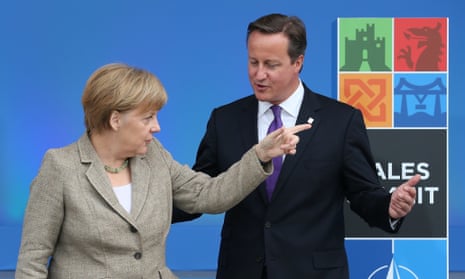David Cameron’s plans to mitigate immigration through reform of the European Union rest on the hope that the EU’s most influential member, Germany, shares some of Britain’s concerns about the effects of immigration.
But new polling data collected by Ipsos Mori, exclusively published in The Guardian, paints a picture of two countries moving in very different directions when it comes to attitudes towards immigration.
For a start, while in Britain immigration currently registers as the most important issue facing the country, people in Germany don’t share the same sense of urgency.
In fact, Britain is somewhat of an outlier when compared to the rest of the EU.
Even more striking is how differently people in the two countries rate how their respective government has handled immigration.
Just 25% of Britons feel the government is doing a good job in managing immigration. The dissatisfaction is cross-party: according to Ipsos Mori, 56% think the job that the current government is doing on immigration is no worse or better than the previous Labour government. Fifty two percent of British voters believe the levels of immigration would stay the same should Labour win the next election. 34% say the number would increase under Ed Miliband’s party. This compares to 16% believing the levels would increase further under the Conservatives, and 23% saying they would be lower. Fifty six per cent think the levels would remain unchanged if the Tories win in May.
This “consensus” is explained by the previous government’s failure to acknowledge the challenges posed by immigration in the 2000s, and by the current government’s inability to deliver on a pledge to cut immigration.
The figures in Germany are very different. While attitudes used to be similarly negative ten years ago, 54% of Germans now feel the government is doing a good job on immigration.
This difference could be due to the fact that the UK has experienced higher levels of net migration through most of the 2000s, even if more recent data shows a very different trend: in 2012, Germany was second only to the United States in the number of immigrants it received.
Another factor considered by Ipsos is that Brits are more concerned about immigration because it is more “visible” in the UK: population density is higher, particularly in England.
Access to the labour market – from the service sector to the civil service – is more restrictive in Germany than in Britain, meaning that fewer Germans perceive immigrants as a direct threat to their job prospects.
But Ipsos Mori’s data also suggests that politicians and the media can play an active role in shaping changing attitudes to immigration. While the German left has traditionally supported the principle of free movement, the centre-right has only gradually been persuaded of the benefits of immigration, mainly by economic and demographic arguments.
Burdened with a low birthrate, Germany’s population has only been growing over the last three years thanks to newly arrived immigrants from the east and south of Europe. Coverage of this trend has hence been broadly positive, even in right-of-centre newspapers such as Frankfurter Allgemeine Zeitung or Die Welt: “We need a golden generation of migrants”, ran a recent op-ed in the latter.
Mekonen Mesghena, a migration expert at the Heinrich Böll Foundation, partly credits Angela Merkel’s aversion to populist gesture for the change in attitudes. “Refugees to Germany may not feel that they are welcomed with open arms, but they feel accepted”.
Recent polling data shows that the proportion of Germans who think migration is a necessity for the national labour market has doubled since 2004, from 27% to 53% now.
Critics of immigration in Germany have traditionally focused on its cultural impact, whereas the public debate in Britain has concentrated more closely on the who and how many. But concerns that high levels of immigration would have a negative effect on education, most notably voiced in ex-Social Democrat Thilo Sarrazin’s 2010 bestseller Deutschland Schafft Sich Ab (“Germany Is Abolishing Itself”), have subsided in recent years. So far, Germany has avoided the kind of riots in immigrant-rich districts seen in Paris, London or Stockholm.
This could be argued to speak in favour of Germany’s active integration policy: since 2005, new and unemployed migrants have had to take obligatory courses in German language, culture, law and history. Germany’s “National Integration Plan” contains over 400 measures for government, business, and social actors that focus on education, the development of language skills and incorporating migrants into the labour market. Chancellor Merkel has been hosting an integration summit since 2006, attended by social groups and stakeholders with an interest in immigration.
Summarising the findings of the report, Bobby Duffy, managing director at Ipsos Mori, said: “The German government has had a particularly active focus on integration that could have made a difference to the often negative image we see of immigration in the UK.”
“But we know numbers still matter. As net migration increases significantly, Germany will need to be mindful of the British experience - even the best laid integration plans will come under pressure if the pace of change is just too fast.”
Ipsos Mori fieldwork was completed by telephone among a nationally representative sample of 1,011 British adults aged 18 and above, and took place between 8th and 10th November 2014.
All additional data is from the standard Eurobarometer, Transatlantic Trends and the European Social Survey.











Comments (…)
Sign in or create your Guardian account to join the discussion